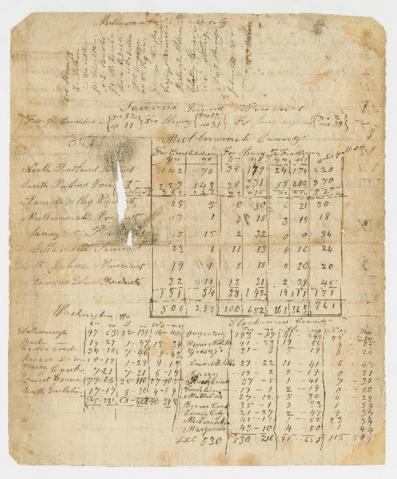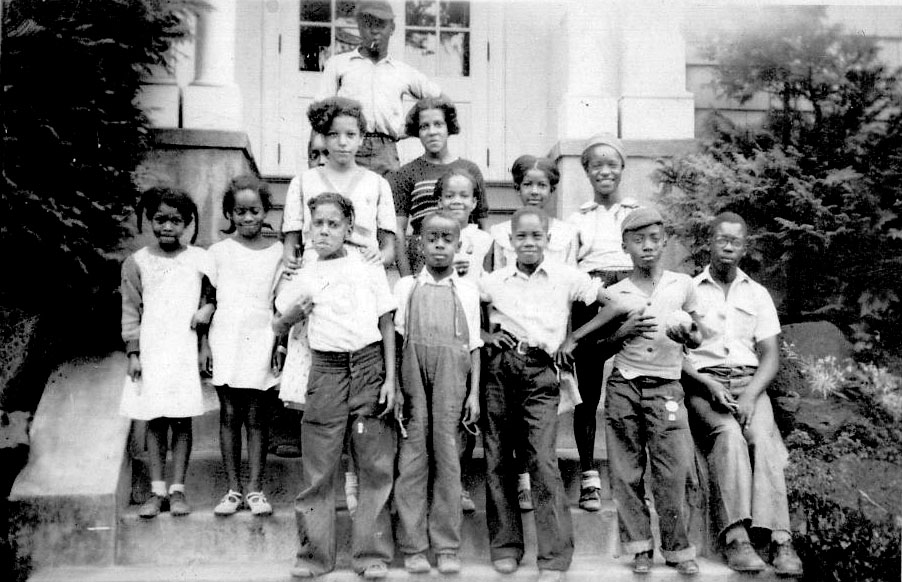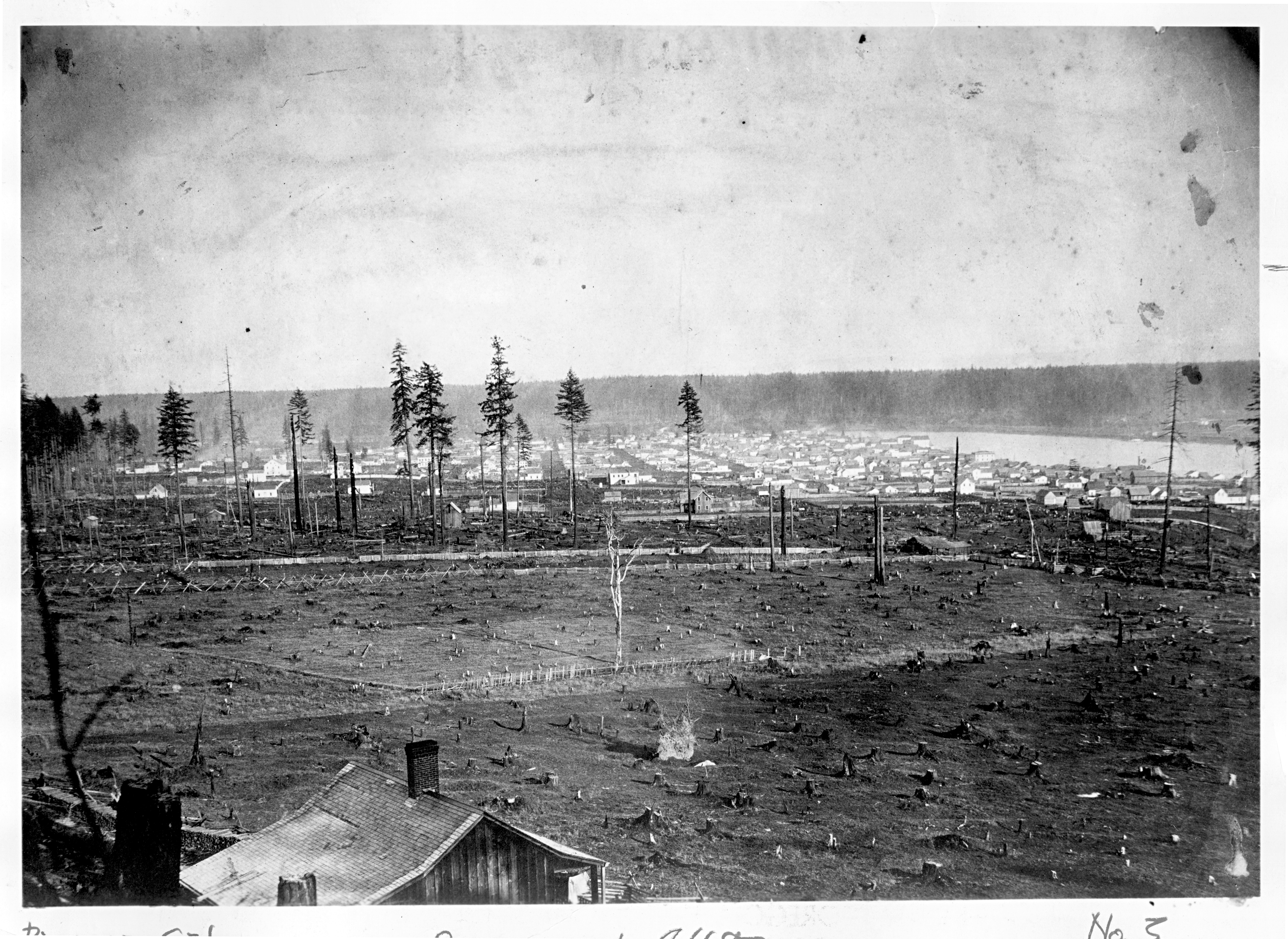A. H. Francis, a free Black, was a merchant and activist who in 1851 opened, with his brother I. B. Francis, what became a leading mercantile and men’s furnishings store in Portland during the city’s founding decade. The brothers successfully resisted Oregon’s Black exclusion laws, and A. H. castigated it before a national audience in a series of letters to Frederick Douglass, who published them in his abolitionist newspaper in New York. The Francis brothers frequented Portland and San Francisco as businessmen and activists, making them among the earliest and most prominent Black residents of both cities.
Abner Hunt Francis—or A. H., as he made himself known—was born in New Jersey in c. 1812. His father, Jacob Francis, was indentured as a youth, but fought in the Revolutionary War and bought his wife Mary’s freedom from her enslaver, Nathaniel Hunt, in 1789. Their sons attended school and learned bookkeeping and tailoring. At the age of nineteen, A. H. was secretary to a meeting of “free people of color” that opposed the removal of Black citizens to Africa. He became an agent of the Liberator, William Lloyd Garrison’s newspaper in New Jersey, before moving to Buffalo, where he opened a men’s clothing store with his older brother Isaac B. “I. B.” Francis (born in 1798). In New York, A. H. Francis was an active abolitionist who created national news by serving on a jury with whites, and he traveled with Frederick Douglass in 1848 to deliver a joint address to the national anti-slavery convention. Francis was accompanied on this trip by his wife, Sydna E. R. Francis (1815–1889), who was active in women's reform efforts.
In 1851, the brothers emigrated from Buffalo to California by steamship and then decided to locate in Oregon. They arrived in Portland on August 10 and opened a mercantile store in the Columbian Hotel at Front and Washington Streets. While A. H. was away on business a few weeks later, I. B. was arrested under Oregon’s 1849 exclusion law. He was arraigned before Orville C. Pratt, associate justice of the territory’s supreme court, in early September 1851. Pratt upheld the law, which A. H. Francis wrote Douglas was “unjust and devilish in all its features,” and ordered both brothers expelled from Oregon within four months. They began to liquidate their stock, but the expulsion was not carried out, possibly because of a petition presented to the legislature in December 1851, signed by over two hundred White Portlanders, that called for the law’s revision and the brothers’ exemption from it. The law remained in force, and public support for exclusion continued.
I. B. Francis managed the brothers’ store from the Columbian Hotel until late 1854, when he announced its relocation to a new two-story brick building at Front and Stark, adjacent to a building owned by William S. Ladd. The brothers advertised their wares frequently, traveled and consigned goods regularly on ships to and from San Francisco, and gained notice among Portland’s merchant class. They appeared on the tax rolls of Washington and then Multnomah Counties, with a financial worth that grew through the 1850s. Sydna and A. H. purchased residential property in San Francisco in 1853, and he circulated petitions to the California legislature against laws barring court testimony from Blacks, and chaired public meetings in that city in support of Black interests and to expand the circulation of Frederick Douglass’ newspaper.
A. H. Francis continued his correspondence with Frederick Douglass and donated and contributed to his newspaper, describing for a national readership examples of institutional prejudice on the Pacific Coast, from a Multnomah County ordinance that prohibited Blacks from swearing an oath to a bill that kept Blacks from voting in Washington Territory. Douglass welcomed the letters from “our old friend” and said in 1854: "Distance does not damp his zeal in the cause of his people’s freedom and elevation."
A. H. maintained the store despite a series of setbacks, beginning in April 1856 with I. B.’s death in California. In 1857, he enlisted a former partner from New York, James W. Garrett, to join him in Portland at A. H. Francis & Co. After Garrett died of fever in May 1858, Benjamin Stark, an avowed secessionist, was appointed to administer his estate. In the meantime, Oregonians had voted overwhelmingly for the state constitution, which prohibited slavery but enacted Black exclusion. Francis continued to advertise in the city’s newspapers without regard to their political bent, with subtly worded copy that encouraged customers to visit his store no matter the day’s controversies.
In late 1858, Francis purchased the lot at Front and Stark, where his store was located (his store was featured that year in Kuchel & Dresser’s lithograph of Portland). He also expanded his trade to Victoria, British Columbia, where the provincial governor was said to have issued an invitation for Blacks to emigrate and become citizens. In August 1861, A. H. and Sydna Francis moved to Victoria, where he opened a store on Fort Street, resumed public advocacy for civil and political rights in the city's flourishing Black community, and lived the rest of his life. The couple sold their Portland lot, at a loss, to Ladd in 1864, leaving behind the city where the decade before A. H. had composed an Independence Day song, which he taught to Sunday school students: “New England sires, hear our prayer;/From the Pacific coast bound shore,/We’re pleading for our rights so dear,/Liberty to all.”
A. H. Francis died in Victoria, British Columbia, on March 27, 1872.
-
![Oregon Weekly Times, Aug. 6, 1853.]()
Advertisements for I.B. Francis's wholesale and retail store on Front Street in the Columbian Hotel at Washington Street..
Oregon Weekly Times, Aug. 6, 1853. Courtesy Oregon Historical Society Research Library
-
![]()
Petition on behalf of I.B. and A.H. Francis, ca. Dec. 1851, to the Oregon territorial legislature, asking that they be exempted from its black exclusion law of 1849..
Oregon Territorial Document no. 621, courtesy Oregon State Archives, Salem, Oregon
-
![]()
Signature of A.H. Francis. Letter to William Henry Seward, Dec. 21, 1842..
Courtesy William Henry Seward Papers, A.S51, Rare Books, Special Collections, and Preservation, University of Rochester, New York
-
![View north from Washington Street, showing the block on which A. H. Francis and I. B. Francis conducted business from 1851 to 1861.]()
Front Street, Portland, June 1862..
View north from Washington Street, showing the block on which A. H. Francis and I. B. Francis conducted business from 1851 to 1861. Portland Art Museum, Portland, Oregon. Gift of Mrs. J.A. Minot, 1998.60.2
-
![A.H. Francis's store is shown on the right of Portland’s principal commercial block at Front and Stark streets.]()
Detail of Kuchel & Dresel’s lithograph, “Portland, Multnomah County, Oregon,1858.”.
A.H. Francis's store is shown on the right of Portland’s principal commercial block at Front and Stark streets. Courtesy Honeyman Collection of Early Californian and Western American Pictorial Material, Bancroft Library
Related Entries
-
![Black Exclusion Laws in Oregon]()
Black Exclusion Laws in Oregon
Oregon's racial makeup has been shaped by three Black exclusion laws th…
-
![Black People in Oregon]()
Black People in Oregon
Periodically, newspaper or magazine articles appear proclaiming amazeme…
-
![Portland]()
Portland
Portland, with a 2020 population of 652,503 within its city limits and …
Related Historical Records
Map This on the Oregon History WayFinder
The Oregon History Wayfinder is an interactive map that identifies significant places, people, and events in Oregon history.
Further Reading
Ripley, C. Peter, ed. The Black abolitionist papers. Vol. 4, The United States, 1847-1855. Chapel Hill: University of North Carolina Press, 1991.
Hawkins, Kenneth. "'A Proper Attitude of Resistance': The Oregon Letters of A. H. Francis to Frederick Douglass, 1851-1860." Oregon Historical Quarterly 121.4 (Winter 2020): 378-415.
Johnson, David Alan. Founding the Far West: California, Oregon, and Nevada, 1840-1890. Berkeley: University of California Press, 1992.
Nokes, R. Gregory. Breaking Chains: Slavery on Trial in the Oregon Territory. Corvallis: Oregon State University Press, 2013.








